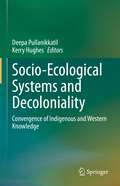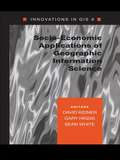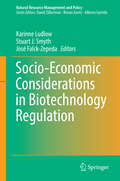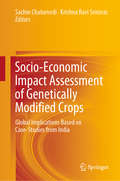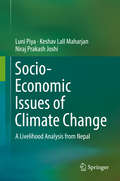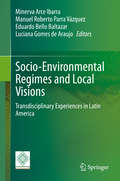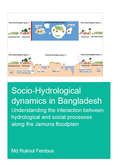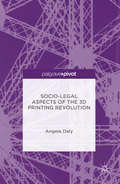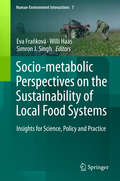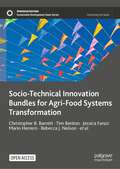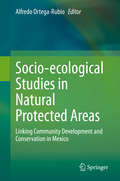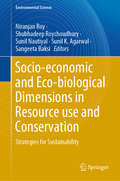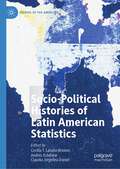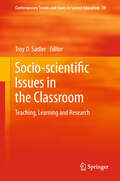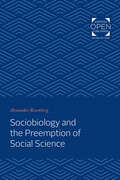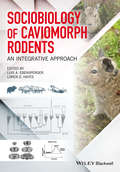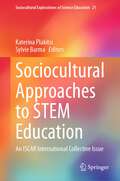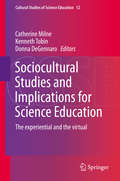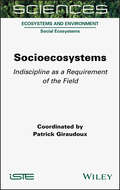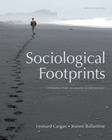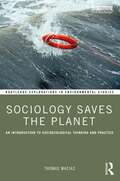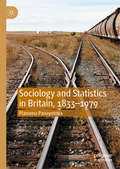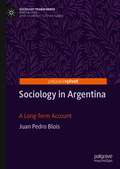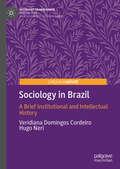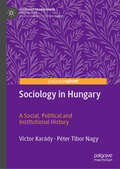- Table View
- List View
Socio-Ecological Systems and Decoloniality: Convergence of Indigenous and Western Knowledge
by Deepa Pullanikkatil Kerry HughesThis contributed volume provides case studies from around the world that feature a convergence of indigenous and western knowledge in an attempt to understand complex socio-ecological systems. The book provides an understanding of socio-ecological systems in an ethical space using a 'Decoloniality' approach (i.e. untangling the production of knowledge from a primarily Eurocentric episteme). The work presented here integrates and merges indigenous knowledge with western science, thereby building on the strengths of each in service of understanding these systems. The editors of this volume approach indigenous communities and scientists as equal knowledge-holders and, in doing so, contributes towards improved understanding of socio-ecological systems and interactions in cross-cultural contexts. This volume will be of interest to scientists, instructors, students and policy makers across disciplines such as environmental sciences, social sciences, interdisciplinary studies, cultural studies, ethnobotany, anthropology and plant genetic resources.
Socio-Economic Applications of Geographic Information Science (Innovations In Gis Ser. #Vol. 9)
by Sean White David Kidner Gary HiggsTo date, no one volume in the Innovations in GIS series has been given over to solely highlighting the use of up-to-date GIS-based techniques in a range of socio-economic applications. This monograph redresses this gap. The book begins with a short introductory chapter on the fundamental principles of GIS, followed by an examination of recen
Socio-Economic Considerations in Biotechnology Regulation
by Karinne Ludlow Stuart J. Smyth José Falck-ZepedaWithin the context of the Convention on Biological Diversity (CBD), the Cartagena Protocol on Biosafety (CPB) was established as an implementing agreement. The CPB is an international agreement establishing the rights of recipient countries to be notified of and to approve or reject the domestic import and/or production of living modified organisms (LMOs). Decisions regarding import/production are to be on the basis of a biosafety assessment. Article 26. 1 of the CPB allows for the (optional) inclusion of socio-economic considerations (SECs) into that biosafety assessment process. This book compiles expert assessments of the issues relevant to SEC assessment of LMOs and fundamental for decisions regarding whether to undertake such assessments at all. It includes an overview of the inclusion of SEC assessment in the regulation of LMOs that looks at the rationale for the inclusion of SECs, in the context of the existing science-based risk assessment systems. This book reviews the various factors that can and have been suggested for inclusion in SEC assessment, and provides a meaningful dialogue about the contrasts, benefits and tradeoffs that are, and will, be created by the potential move to the inclusion of SECs in the regulation of LMOs, making it of interest to both academics and policy-makers.
Socio-Economic Impact Assessment of Genetically Modified Crops: Global Implications Based on Case-Studies from India
by Sachin Chaturvedi Krishna Ravi SrinivasThis book provides a comprehensive overview of socio-economic impact assessments for genetically modified organisms, including genetically modified crops. It features case studies involving Bt cotton and other selected crops with improved traits from six major institutions in India and combines field data with surveys on stakeholder perceptions. It also discusses global trends in the socio-economic assessment of GMOs and reviews the available literature on the economic assessment of GM crops and how various countries have implemented Article 26.1 of the Cartagena Protocol on Biosafety. Further, it explores cost–benefit analyses and sociological aspects of socio-economic assessments.Based on this, the book proposes a framework and offers guidelines for socio-economic assessment that can be adapted for various GM crops. Lastly, it examines the relevance of socio-economic impact assessment in light of new applications such as GM mosquitoes and gene drives. Given its scope, the book is of interest to all academics, policymakers, regulators, and general readers concerned about the broader impacts of GM crops and applications like gene drives.
Socio-Economic Issues of Climate Change: A Livelihood Analysis from Nepal
by Keshav Lall Maharjan Niraj Prakash Joshi Luni PiyaThis book conducts a holistic analysis of climate change perceptions, vulnerabilities, impacts, and adaptation, based on the primary household-data collected from the Chepang community residing in the rural Mid-Hills of Nepal. Socio-economic and demographic data from the household survey is integrated with meteorological and spatial data to conduct an integrated analysis. Quantitative analysis is also supplemented by qualitative information. Given the context of ongoing climate change, the livelihoods issues of a highly marginalized Chepang community form the center-point of analysis. The book demonstrates that balanced assets possession is a prerequisite to strengthen the adaptive capacity of the households. Furthermore, the ability of translating adaptive capacity into adaptation actions is determined by the households’ ability to correctly perceive the changes and their access to various assets. The book recommends to ensure the availability of non-farm livelihood opportunities along with access to formal/vocational education and skill development training as these are the key factors contributing to reduce the vulnerability. The book concludes that mainstreaming of climate change into development efforts is a must for sustainable development.
Socio-Environmental Regimes and Local Visions: Transdisciplinary Experiences in Latin America
by Minerva Arce Ibarra Manuel Roberto Parra Vázquez Eduardo Bello Baltazar Luciana Gomes de AraujoThis book presents oral histories, collective dialogues, and analyses of rural and indigenous livelihoods facing global socio-environmental regime change in Latin America (LA). Since the late twentieth century, rural and indigenous producers in LA, including agriculturists, coffee-growers, as well as small-scale farmers/fishers, and others, have had to resist, cope with, or adapt to a range of neoliberal socio-environmental regimes that impact their territories and associated resources, including water, production systems and ultimately their cultural traditions. In response, rural producers are using local visions and innovation niches to decide what, when, and how to resist, cope with uncertainty, and still be successful in using their customary laws to retain their land rights and livelihoods.This book presents a range of ethnically diverse case studies from LA, which addresses socio-environmental, educational, and law regimes’ effects using transdisciplinary research approaches in rural, traditional and indigenous production systems. Based on both, the results and insights gained into how producers are resisting and adapting to these regimes, as well as decades of research carried out in LA rural territories by the participating authors, the book puts forward a baseline for devising new public policies that are better suited to the real challenges of livelihoods, poverty, and environmental degradation in LA. These recommendations are rooted in post-development thinking; they promote territorial public policy with social inclusion and a human’s rights approach. The book draws on over 20 years of research carried out by LA’s academics and their undergraduate and graduate students who have addressed collaborative work, participatory research, and transdisciplinary approaches with rural commons and communities in LA. It features 19 case studies, with contributions from Argentina, Bolivia, Brazil, Colombia, Cuba, Honduras, and Mexico.
Socio-Hydrological Dynamics in Bangladesh: Understanding the Interaction Between Hydrological and Social Processes Along the Jamuna Floodplain (IHE Delft PhD Thesis Series)
by Md Ruknul FerdousBangladesh is a large delta, where most people live in the overpopulated floodplains. Flooding is a normal phenomenon, which causes much suffering. How to reduce this suffering through better managing floods is a big societal challenge. To date, societal initiatives to address this challenge mainly consist of the construction of embankments along the river bank, to control hydrological processes and ‘discipline’ the river. Yet, such embankments generate their own hydrological and societal responses in sometimes unexpected ways. The study of these interactions and feedback mechanisms between hydrological and social processes is a new academic field, one that is particularly relevant in a dynamic delta such as Bangladesh. This research sets out to explore the phenomena, opportunities and risks generated by the interactions between physical and societal processes along the Jamuna River in Bangladesh. It conceptualize these interactions as temporally dynamic and spatially diverse combinations of fighting and living with water. The research proposes the concept of "Socio-hydrological spaces (SHSs)" to enrich the study of socio-hydrology. A SHS is a geographical area in a landscape. Its particular combination of hydrological and social features gives rise to the emergence of distinct interactions and dynamics (patterns) between society and water. The SHSs concept suggests that the interactions between society and water are place-bound and specific because of differences in social processes, technological choices and opportunities, and hydrological dynamics. Through the concept of SHS, this research does not only contribute to advance the knowledge about socio-hydrological dynamics in Bangladesh, but also provides more general insights for flood risk management.
Socio-Legal Aspects of the 3D Printing Revolution
by Angela DalyAdditive manufacturing or '3D printing' has emerged into the mainstream in the last few years, with much hype about its revolutionary potential as the latest 'disruptive technology' to destroy existing business models, empower individuals and evade any kind of government control. This book examines the trajectory of 3D printing in practice and how it interacts with various areas of law, including intellectual property, product liability, gun laws, data privacy and fundamental/constitutional rights. A particular comparison is made between 3D printing and the Internet as this has been, legally-speaking, another 'disruptive technology' and also one on which 3D printing is partially dependent. This book is the first expert analysis of 3D printing from a legal perspective and provides a critical assessment of the extent to which existing legal regimes can be successfully applied to, and enforced vis-à-vis, 3D printing.
Socio-Metabolic Perspectives on the Sustainability of Local Food Systems: Insights for Science, Policy and Practice (Human-Environment Interactions #7)
by Eva Fraňková Willi Haas Simron J. SinghThis book delves into diverse local food systems and critically assesses their ecological and societal benefits and trade-offs, their limits and opportunities for improving sustainability of food production, and framework conditions which either hinder or promote their development. More and more people with gradually meat heavier diets will demand growth in food production, whilst our increasingly industrialized and globalized agri-food system has already caused serious sustainability problems in the past. This calls for a change in the way we produce, distribute and consume food. A re-emerging debate on food security and food sovereignty seems to support this quest. But what are the promising alternatives to mainstream developments? Such a discussion regarding sustainability of local food systems requires a sound systemic understanding and thus invites a socio-metabolic reading of local cases by analyzing the nexus between material and energy flows as well as land and time use. This approach is needed to complement the so far mostly qualitatively-based local food studies. Applying socio-metabolic approaches to local food systems fosters a better understanding of promises and pitfalls for sustainable pathways in the future.
Socio-Technical Innovation Bundles for Agri-Food Systems Transformation (Sustainable Development Goals Series)
by Steven James Christopher B. Barrett Stephen Wood Jessica Fanzo Tim Benton Roy Steiner Shenggen Fan Mario Herrero Rebecca J. Nelson Elizabeth Bageant Edward Buckler Karen Cooper Isabella Culotta Rikin Gandhi Mark Kahn Laté Lawson-Lartego Jiali Liu Quinn Marshall Daniel Mason-D'Croz Alexander Mathys Cynthia Mathys Veronica Mazariegos-Anastassiou Alesha Miller Kamakhya Misra Andrew Mude Jianbo Shen Lindiwe Majele Sibanda Claire Song Philip ThorntonThis open access book is the result of an expert panel convened by the Cornell Atkinson Center for Sustainability and Nature Sustainability. The panel tackled the seventeen UN Sustainable Development Goals (SDGs) for 2030 head-on, with respect to the global systems that produce and distribute food. The panel’s rigorous synthesis and analysis of existing research leads compellingly to multiple actionable recommendations that, if adopted, would simultaneously lead to healthy and nutritious diets, equitable and inclusive value chains, resilience to shocks and stressors, and climate and environmental sustainability.
Socio-ecological Studies in Natural Protected Areas: Linking Community Development and Conservation in Mexico
by Alfredo Ortega-RubioThis book explores the interactions of local inhabitants and environmental systems in the Protected Natural Areas of Mexico. Its goal is to help understand how social groups contextualize ecological knowledge, how human activities contribute to modifying the environmental matrix, how cultural and economic aspects influence the use, management and conservation of their ecological environment, and how social phenomena are to be viewed against the backdrop of ecological knowledge.The book reviews the epistemological and historical bases of the socio-ecological relationship, and addresses the evolution of human-natural systems. From a methodological standpoint, it assesses the tools required for the integration of “human” and “natural” dimensions in the management of the environmental matrix. Further, in the case studies section, it reviews valuable recent experiences concerning the retro-interactions of local inhabitants with their environmental matrix. Given its scope, the book offers a valuable asset for researchers and professionals all over the world, especially those working in Latin American countries.
Socio-economic and Eco-biological Dimensions in Resource use and Conservation: Strategies for Sustainability (Environmental Science and Engineering)
by Sunil Nautiyal Niranjan Roy Shubhadeep Roychoudhury Sunil K. Agarwal Sangeeta BaksiThis book presents the outcomes of the 2017 national workshop and international conference organized by CEENR of ISEC, Bengaluru and Assam University Silchar. Addressing the threats to biodiversity and sustainable development resulting from the impacts of human induced pressures on ecosystems and global-warming-driven climate change is a major challenge. It requires increased knowledge and an enhanced information base in order to devise local policies to improve the adaptive capacity of vulnerable socio-ecological systems in developing countries. In this context, the book presents research that has the potential to benefit the environment and empower communities. It appeals to researchers investigating diverse aspects of socio-ecological-biological systems to create strategies for resource use, conservation and management to ensure sustainability.
Socio-political Histories of Latin American Statistics (Studies of the Americas)
by Cecilia T. Lanata-Briones Andrés Estefane Claudia Jorgelina DanielThis book brings together recent research on the sociopolitical history of Latin American statistics from the nineteenth to the first half of the twentieth century. Reflecting the influence of social constructivism in the social sciences, it sheds new light on the historical emergence and development of both statistical reasoning and practices within a region traditionally seen as a passive consumer of foreign-produced theories and methods. By analysing the processes of institutionalisation of statistics in different national spaces, from Mexico to the Southern Cone, these studies show the unique ways in which Latin America adapted and used this modern tool of government and social classification to build political regimes and scientific arenas. The early enthusiasm for enumerating reality, the regular production of statistics and censuses, and the role of the region in the global transformation of this knowledge are some of the aspects reviewed to grasp the contingent dynamic of these dialogues and appropriations. Thus, Socio-political Histories of Latin American Statistics seeks to offer new insights into the divergent regional trajectories of this discipline, advancing towards an understanding of statistics and its past from a truly global perspective.
Socio-scientific Issues in the Classroom
by Troy D. SadlerSocio-scientific issues (SSI) are open-ended, multifaceted social issues with conceptual links to science. They are challenging to negotiate and resolve, and they create ideal contexts for bridging school science and the lived experience of students. This book presents the latest findings from the innovative practice and systematic investigation of science education in the context of socio-scientific issues. Socio-scientific Issues in the Classroom: Teaching, Learning and Research focuses on how SSI can be productively incorporated into science classrooms and what SSI-based education can accomplish regarding student learning, practices and interest. It covers numerous topics that address key themes for contemporary science education including scientific literacy, goals for science teaching and learning, situated learning as a theoretical perspective for science education, and science for citizenship. It presents a wide range of classroom-based research projects that offer new insights for SSI-based education. Authored by leading researchers from eight countries across four continents, this book is an important compendium of syntheses and insights for veteran researchers, teachers and curriculum designers eager to advance the SSI agenda.
Sociobiology and the Preemption of Social Science
by Alexander RosenbergOriginally published in 1981. Why have the social sciences in general failed to produce results with the ever-increasing explanatory power and predictive strength of the natural sciences? In seeking an answer to this question, Alexander Rosenberg, a philosopher of science, plunges into the controversial discipline of sociobiology. Sociobiology, Rosenberg asserts, deals in those forces governing human behavior that traditional social science has unsuccessfully attempted to slip between: neurophysiology, on the one hand, and selective forces, on the other. Unlike previous works in the two fields it straddles, Rosenberg's book brings thinking about the nature of scientific theorizing to bear on the most traditional issues in the philosophy of social science. The author finds that the subjects of conventional social science do not reflect the operation of laws that social scientists are equipped to discover. The author argues that much of the debate surrounding sociobiology is irrelevant to the issue of its ultimate success. Although largely conceptual, the book is an unequivocal defense of this new theory in the explanation of human behavior.
Sociobiology of Caviomorph Rodents
by Loren D. Hayes Luis A. EbenspergerFully integrative approach to the socibiology of caviomorph rodents Brings together research on social systems with that on epigenetic, neurendocrine and developmental mechanisms of social behavior Describes the social systems of many previously understudied caviomorph species, identifying the fitness costs and benefits of social living in current day populations as well as quantified evolutionary patterns or trends Highlights potential parallels and differences with other animal models
Sociocultural Approaches to STEM Education: An ISCAR International Collective Issue (Sociocultural Explorations of Science Education #21)
by Katerina Plakitsi Sylvie BarmaThis book is a contribution to the sociocultural approaches to Science Technology Engineering and Mathematics (STEM) Education. It offers a new interpreting theoretical framework coming from the Cultural Historical Psychology. The authors highlight some serious elements of the sociocultural context that mediates learning on STEM or with STEM adds. The book brings together the work of researchers interested in developmental psychology and childhood, with a special focus on using Activity theory and Cultural-historical research approach to unite these two opposing approaches to the study of children. The authors reconsider our relationship and experiencing with technology. It moves the attention from the pure instrumental aspect of technology to a deep human and societal approach. Moreover, the book focuses on the issue of teachers' continuing education in both formal and informal settings is being seen under a sequential system of expansive cycles and the key role of contradictions in transformative educational settings. Overall, this book encourages the academic society to open dialogue with other societies and enhance interdisciplinary research in times of crisis.
Sociocultural Studies and Implications for Science Education
by Kenneth Tobin Catherine Milne Donna DegennaroThe chapters included in this book address two major questions: what are some of the methodological and theoretical issues in sociocultural research in urban education and science education and what sort of questions do technological and virtual contexts raise for these types of research perspectives. The chapters build off Ken Tobin's personal history of sociocultural research in science education and as they do each chapter asks philosophical, sociological and/or methodological questions that inform our understanding of the challenges associated with conducting research in experiential and virtual contexts.
Socioecosystems: Indiscipline as a Requirement of the Field
by Patrick GiraudouxThe idea of socioecosystems answers the growing need to understand, in the context of the Anthropocene, how adaptive processes interact, and how that interplay results in the coevolution of living beings. Studying socioecosystems means taking into account the diversity of temporal and physical scales in order to grasp how ecological, social and economic forces are interwoven. Based on these drivers, the complex dynamics that determine the habitability of the Earth emerge. This book analyzes, through concrete cases from regional socioecosystems on several continents, how research action has provided answers to problems related to agriculture, health and the conservation of biodiversity. It demonstrates that these undertakings could not have succeeded without the combined efforts of the communities of living beings and objects, the community of knowledge and the communities of action. These examples are accompanied by a reflection on the conditions that make it possible to bring this research to completion.
Sociological Footprints: Introductory Readings in Sociology
by Jeanne H. Ballantine Leonard CarganIntended as a supplemental reader, but also used as a main text for the introductory sociology and social sciences courses at both two- and four-year schools.
Sociology Saves the Planet: An Introduction to Socioecological Thinking and Practice (Routledge Explorations in Environmental Studies)
by Thomas MaciasHighlighting how the environment and society are intrinsically linked, this book argues that environmental concerns need to be treated as a core concept in the study of sociology. Given its focus on inequality and the constituent elements of the social world, sociology has often been accused of negligence regarding the urgency of the world’s environmental crisis. Sociology Saves the Planet corrects this mis-perception by integrating the theme of environment and society to highlight the intrinsic value a sociological perspective brings to our understanding of the current ecological crisis. The author first draws out the origins of sociology in the social and ecological transformations of the industrial revolution. In accounting for the social upheavals of the 19th century, Emile Durkheim, Karl Marx, and Max Weber all provided key insights into the changing nature of human organization and exploitation of the natural world. Second, readers will explore sociological perspectives developed since that time, grounded in evidence-based research, which highlight the inextricable connection between environment and society. Special attention is devoted to the dual role of people as producers and consumers in the modern context. Lastly, this book examines the significance of major categories of social difference regarding the current environmental crisis. In that regard the question of environmental justice is paramount, illuminating both the disproportionate benefit of natural resource exploitation to those countries and individuals with higher socioeconomic status, and the greater exposure to environmental hazard among those with less. Averting global calamity requires we recognize the unequal social impacts of the environmental crisis while valorizing inclusivity and the diversity of human experience in our search for solutions. Designed for introductory courses, this book is essential reading for sociology students and will be of interest to students and academics studying environment and sustainability more broadly.
Sociology and Statistics in Britain, 1833–1979
by Plamena PanayotovaAt the beginning of the twentieth century, Britain stood at the forefront of science and statistics and had a long and respected tradition of social investigation and reform. But it still did not yet have a ‘science of society.’ When, in the early 1900s, a small band of enthusiasts got together to address this situation, the scene was set for a grand synthesis. No such synthesis ever took place and, instead, British sociology has followed a resolutely non-statistical path. Sociology and Statistics in Britain, 1833-1979 investigates how this curious situation came about and attempts to explain it from an historical perspective. It uncovers the prevalence of a deep and instinctive distrust within British sociology of the statistical methodology and mindset, resulting in a mix of quiet indifference and active hostility, which has persisted from its beginnings right up to the present day. While British sociology has thrived institutionally since the post-war expansion of higher education, this book asks whether or not it is poorer for having failed to recognise that statistics provides the foundations for the scientific study of society and for having missed opportunities to build upon those foundations. Ultimately, this important, revealing and timely book is about British sociology’s refusal to come to grips with a modern scientific way of thinking which no discipline that aspires to an effective study of society can afford to ignore.
Sociology in Argentina: A Long-Term Account (Sociology Transformed)
by Juan Pedro BloisThis Palgrave Pivot offers a comprehensive portrayal of the development of sociology in Argentina from the mid-1950s to the present day. This first long-term account in English maps the discipline’s troubled trajectory and its close relation to the broader (and turbulent) Argentinian political and economic context, and provides a dramatic exemplification of the politicization and polarization of an academic field and its consequences. Divided in seven chapters, this book examines the sharply different phases that the discipline went through: from the pioneering 1950s, in which sociology was presented as a “science”, to the activist revolt in the 1960s, led by the student movement, to the traumatic experience of the 1970s, when a cruel dictatorship was established and many sociologists were persecuted, and from its progressive recovery from the 1980s to its current growing (yet unstable) presence within academia, and within state agencies, corporations and consulting agencies, and NGOs. This work will appeal to social scientists and students interested in the relations between academia and politics, and to a general readership interested in the recent history of Argentina and Latin-America.
Sociology in Brazil: A Brief Institutional and Intellectual History (Sociology Transformed)
by Veridiana Domingos Cordeiro Hugo NeriThis book provides an overview of the institutional and intellectual development of sociology in Brazil from the early 1900s to the present day; through military coups, dictatorships and democracies. It charts the profound impact of sociology on Brazilian public life and how, in turn, upheavals in the history of the country and its universities affected the its scientific agenda. This engaging account highlights the extent of the discipline’s colonial inheritance, its early institutionalization in São Paulo, and its congruent rise and fall during repeated regime changes. The authors’ analysis draws on original research that maps the concentration of research interests, new developments, publications and centers of production in Brazilian sociology, using qualitative and quantitative data. It concludes with a reflection on the potential impact of the recent far-right turn in Brazilian politics on the future of the discipline. This book contributes a valuable country study to the history of sociology and will appeal to a range of social scientists in addition to scholars of disciplinary historiography, intellectual and Brazilian history.
Sociology in Hungary: A Social, Political and Institutional History (Sociology Transformed)
by Victor Karády Péter Tibor NagyThis book is the first English-language study of the social, intellectual and institutional history of sociology and the social sciences in Hungary. Starting with the emergence of the discipline in the early 20th century, Karady and Nagy chart its development throughout various transformations of Hungarian society: from the liberal Dual Monarchy, through the respective Christian and Stalinist regimes, and culminating in the modern scholarly field today. Drawing on large-scale prosopographical materials, the authors use empirically-based socio-historical analysis to measure the impact of successive and radical regime changes on the country's intellectual life. This will be an important and original point of reference for scholars and students of historical sociology, and Eastern European intellectual history.
